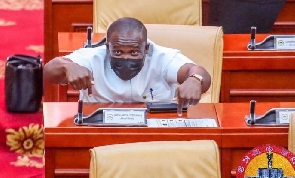 Sam Nartey George, MP for Ningo Prampram
Sam Nartey George, MP for Ningo Prampram
Government still struggling to pass E-levy bill
Sam George wants government to look elsewhere to raise revenue
The state should pursue social media giants and betting companies
Sam Nartey George, Member of Parliament for Ningo Prampram, has tasked the government to look elsewhere to generate taxes instead of pushing ahead with the controversial E-levy.
According to him, the government must do all it takes to protect the growing digital economy instead of tax it and by so doing reverse gains made over the years.
Sam George pointed out that it will be more beneficial for the government to pursue individuals and companies benefitting from the digital economy by imposing corporate taxes on their activities.
That, he believes will be better than chasing innocent citizens with the E-levy, a tax he described as anti-digitization drive and discriminatory because of the extra cost it imposes on the digital purchaser and a person paying for goods or services with cash.
He stressed that the projected GH¢6.9 billion that the government is hoping to raise via tax will not be made because of the nature of the industry.
Speaking on Accra-based Hitz FM, the lawmaker submitted: “I believe we should have an electronic tax… but the way to do an electronic tax is to tax the persons who are benefitting from the digital economy.
“So there are many people who are selling on Instagram and Facebook, it is those businesses you must go after, to register and make them pay corporate taxes. You must go after the likes of Facebook, WhatsApp, Instagram and Twitter.
“They must come and put their servers locally in Ghana so that you are able to tax them for money, that is what other countries are doing,” he stressed.
On the subject of the betting companies, he alleged that given that servers of such companies were outside the country, it was difficult for the Ghana Revenue Authority (GRA) to do a correct assessment of how much corporate taxes they have to pay to the state.
“The betting companies, they are killing the country, there is a lot of betting going on, their servers are not in Ghana, so the GRA is unable to tell the quantum of bets that have been placed so that you go and tax them.
“Their servers are in South Africa, they tell you what it is that they have received and choose to pay and take it from me, many of them are declaring only about 30-40% of what the revenue. If we go after all these loopholes, we will not need E-levy,” he added.
The E-levy since its announcement by the Finance Minister in November 2021 has received public backlash from some Ghanaians especially Members of Parliament from the Minority Caucus.
At a recent press conference, the Minister announced a number of modifications to the Bill and said the government continued to engage stakeholders on the bill ahead of resubmission before MPs.
Background
On November 17, 2021, Finance Minister, Ken Ofori-Atta, announced the introduction of a 1.75% tax on all electronic transactions during the 2022 budget presentation before parliament.
According to him, this new directive forms part of strategies to widen the country’s tax net.
He added that the 1.75% tax is also to enhance financial inclusion and protect the vulnerable in the country.